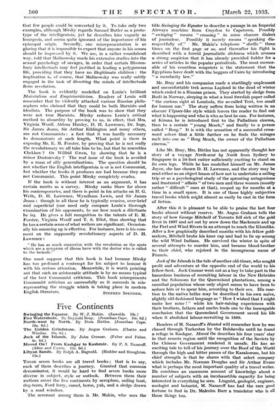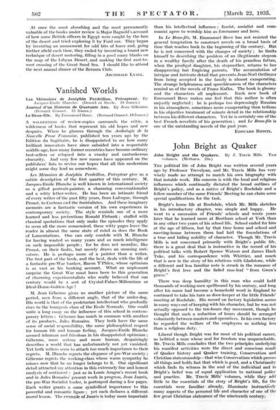Five Continents
10s. 6d.)
THESE seven books are all travel books ; that is to say, each of them describes a journey. Granted that common denominator, it would be hard to find seven books more diverse in subject, style or outlook. Between them their authors cover the five continents by aeroplane, sailing boat, dog-team, Ford lorry, camel, horse, yak, and a sledge drawn
by a mad reindeer.
The aeronaut among them is Mr. Makin, who uses the title Swinging the Equator to describe a passage in an Imperial Airways machine from Croydon to Capetown. Possibly " swinging " means " crossing " in some obscure dialect of journalese. Possibly it merely means " speaking dis- respectfully of." Mr. Makin's telephone " shrills " three times on the first page or so, and thereafter his flight is described with a horrid journalistic slickness which arouses a strong suspicion that it has already provided fodder for a series of articles in the popular periodicals. The most memor- able of his countless misprints is the statement that the Egyptians have dealt with the beggars of Cairo by introducing " a mendacity law."
Mr. Bray and his companion made a startlingly unpleasant and uncomfottable trek across Lapland in the dead of winter which ended in a Russian prison. They started by sledge from Bodo in Norway, sleeping in what a local Swedish paper called " the curious sight at Lombola, the so-called Tent, too small for human use." The story suffers from being written in an obscure Ulysses-like style which leaves the reader to find out what is happening and who is who as best he can. For instance, at Kiruna he is introduced first to the Palladium cinema, then to a certain " young Mesch," and finally to a person called " Borg." It is with the sensation of a successful cross- word solver. that a little -further on he finds the mirages melt into one as " Borg Mesch, the owner of the Palladium cinema."
Like Mr. Bray, Mrs. Birtles has not apparently thought her story of a voyage North-west by North from Sydney to Singapore in a 34-foot cutter sufficiently exciting to stand on its own legs. While he has modelled himself on Mr. James Joyce, she has chosen D. H. Lawrence, and the story may be read either as an object lesson of how not to undertake a sailing trip or as a psychological study of the sprouting antagonisms and frustrated " affairs " of two men and three women (mostly rather -" difficult " ones at that), cooped up for months at a time in a small space. It is one of those highly subjective travel books which might almost as easily be cast in the form of fiction.
After this it is pleasant to be able to praise the last four books almost without reserve. Mr. Angus Graham tells the story of how George Mitchell of Toronto fell sick of the gold fever in 1897 and set out by scow down the Mackenzie and up the Peel and Wind Rivers in an attempt to reach the Klondike. After a few graphically described months with his fellow gold- seekers, Mitchell broke his knee cap and had to lie up among the wild Wind Indians. He survived the winter in spite of several attempts to- murder him, and became blood-brother to their chief, who rejoiced in the incongruous name of Francis.
Jock of the Islands is the tale of another old-timer, who sought profit and adventure at the opposite end of the world to his fellow-Scot. Jock Cromar went out as a boy to take part in the hazardous business of recruiting labour in the New Hebrides and the Solomons for the Queensland plantations, among a cannibal population whose only objeet seems to have been to seduce him or to spear him, according to their sex. His reac- tion to the native belles may be described in his own naive, slightly old-fashioned language as " How I wished that I might make her mine 1 " while his hair-raising experiences with their brothers, fathers and uncles leads one to the inescapable conclusion that the Queensland Government saved his life when it abolished labour-recruiting in 1889.
Readers of M. Nazaroff's Hunted will remember how he was chased through Turkestan by the Bolsheviks until he found a refuge in Kashgar. Moved On describes his four years' stay in that remote region until the recognition of the Soviets by the Chinese Government rendered it unsafe. He has an exciting tale to tell of his journey over the Roof of the World through the high and bitter passes of the Karakorum, but his chief strength is that he shares with that select company which includes Mr. Norman Douglas and Sir Arthur Evans what is perhaps the most important quality of a travel writer. He combines an enormous amount of knowledge about a number of subjects with an inexhaustible capacity for being interested in everything he Sees. Linguist, geologist, engineer, zoologist and botanist, M. Nazaroff has had the rare good fortune to find in Dr. Malcolm Burr a translator who is all those things too.
At once the most absorbing and the most permanently valuable of the books under review is Major Bagnold's account of how some British officers in Egypt were caught by the lure of the desert and tried exploring it by Ford car. They began by inventing an amusement for odd bits of leave and, going further afield each time, they ended by inventing a brand new technique of desert motoring, filling in a good many blanks on the map of the Libyan Desert, and making the first east-to- west crossing of the Great Sand Sea. I should like to attend the next annual dinner of the Zerzura Club.
ARCHIBALD LYALL.





























































 Previous page
Previous page